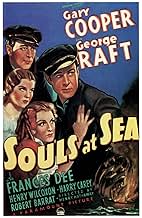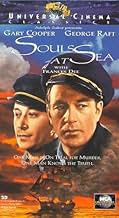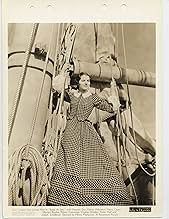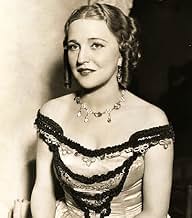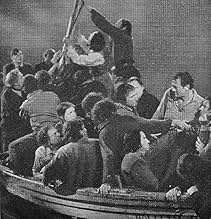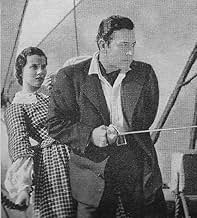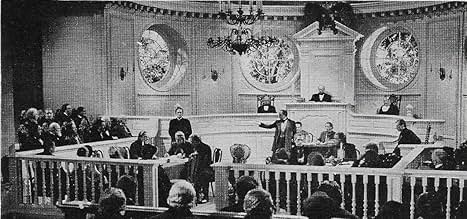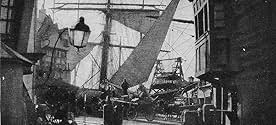अपनी भाषा में प्लॉट जोड़ेंCooper and Raft save lives during a sea tragedy in this story about slave trade on the high seas in 1842.Cooper and Raft save lives during a sea tragedy in this story about slave trade on the high seas in 1842.Cooper and Raft save lives during a sea tragedy in this story about slave trade on the high seas in 1842.
- निर्देशक
- लेखक
- स्टार
- 3 ऑस्कर के लिए नामांकित
- 3 जीत और कुल 3 नामांकन
Norman Ainsley
- Ticket Taker
- (बिना क्रेडिट के)
फ़ीचर्ड समीक्षाएं
Souls at Sea (SAS) is an unusual film from Gary Cooper's peak years with Paramount Studios. It is obscure and hard to find. However, SAS is now available on YouTube, so those who are unfamiliar with it now have the rare opportunity to judge its merits for themselves.
SAS was originally planned to be a much more important film than the one we now have before us. Somewhere along the way, Paramount abandoned its ambitions for SAS. What eventually emerged, while hardly an epic, is an interesting entertainment that deals with important issues and deserves a larger audience.
The plot considers a back story involving the notorious slave trade that persisted into the nineteenth century, and the efforts by some individuals to take matters into their own hands to curtail the practice. But the more important part of the film deals with an unexpected shipwreck and the resulting inadequate lifeboat space available to accommodate its survivors. Cooper as the first mate faces the incredible dilemma of suddenly having to "play God" and determine which survivors must be sacrificed in an effort to save the lives of all the others.
This part of the story is based on fact. The actual case, U. s. v. Holmes, is a famous Supreme Court precedent known to anyone familiar with Criminal Law and the legal subject of homicide. Holmes, the first mate, was actually tried for manslaughter in connection with the deaths of those he consigned to die hoping to save the rest of the survivors. Was the defense of justifiable homicide available to Holmes under these facts? The legal answer was no. However, shortly after he had been found guilty of manslaughter, Holmes was freed from imprisonment. So what does the case stand for? Legal scholars argue about it to this day.
SAS presents the Holmes case in a fictional setting, yet it retains a similar ending. The Cooper character, now called Taylor, is set free after his trial. But the circumstances of this development may be more the result of his involvement in the back story of the plot than in the moral and ethical quandary of having to "play God" with the lives of innocent people to save others who might otherwise have perished.
For another take on the Holmes story, check out the Tyrone Power British film Seven Waves Away/Abandon Ship! (1957).
SAS has an extraordinary cast of supporting actors and splendid camera work--particularly in the climactic sequence involving the shipwreck. Cooper and George Raft make a surprisingly good "buddy" pairing, and SAS provides a rare opportunity to see the exotic beauty Olympe Bradna in one of her few Hollywood films.
All in all, SAS is a film that is well worth seeing, and deserves a wider audience than it now enjoys.
SAS was originally planned to be a much more important film than the one we now have before us. Somewhere along the way, Paramount abandoned its ambitions for SAS. What eventually emerged, while hardly an epic, is an interesting entertainment that deals with important issues and deserves a larger audience.
The plot considers a back story involving the notorious slave trade that persisted into the nineteenth century, and the efforts by some individuals to take matters into their own hands to curtail the practice. But the more important part of the film deals with an unexpected shipwreck and the resulting inadequate lifeboat space available to accommodate its survivors. Cooper as the first mate faces the incredible dilemma of suddenly having to "play God" and determine which survivors must be sacrificed in an effort to save the lives of all the others.
This part of the story is based on fact. The actual case, U. s. v. Holmes, is a famous Supreme Court precedent known to anyone familiar with Criminal Law and the legal subject of homicide. Holmes, the first mate, was actually tried for manslaughter in connection with the deaths of those he consigned to die hoping to save the rest of the survivors. Was the defense of justifiable homicide available to Holmes under these facts? The legal answer was no. However, shortly after he had been found guilty of manslaughter, Holmes was freed from imprisonment. So what does the case stand for? Legal scholars argue about it to this day.
SAS presents the Holmes case in a fictional setting, yet it retains a similar ending. The Cooper character, now called Taylor, is set free after his trial. But the circumstances of this development may be more the result of his involvement in the back story of the plot than in the moral and ethical quandary of having to "play God" with the lives of innocent people to save others who might otherwise have perished.
For another take on the Holmes story, check out the Tyrone Power British film Seven Waves Away/Abandon Ship! (1957).
SAS has an extraordinary cast of supporting actors and splendid camera work--particularly in the climactic sequence involving the shipwreck. Cooper and George Raft make a surprisingly good "buddy" pairing, and SAS provides a rare opportunity to see the exotic beauty Olympe Bradna in one of her few Hollywood films.
All in all, SAS is a film that is well worth seeing, and deserves a wider audience than it now enjoys.
I was hoping for a melodrama instead, but the emphasis here is on the narrative rather than on action. But I am pleased to report that my headline is accurate, because "Souls At Sea" is a very interesting story about a subject barely touched upon in Hollywood's long, colorful history. Reading through other reviewers takes on the film, it qualifies more accurately as a semi-historical drama, although not the first story Hollywood has taken liberties with. The temptation is to call "Souls At Sea" a 'seafaring yarn', but, as I said, it is heavy on talk and light on second unit work.
In any case, this offbeat movie has Gary Cooper faced with a moral dilemma as an abolitionist involved in the slave trade in the middle of the 19th century. His sidekick is George Raft, in as sympathetic a role as he ever had and one of his best acting jobs (never one of his strong points). Frances Dee is an ingenue on board the ship in question, and George Zucco plays a good guy for a change. Particularly effective is the background music which won an AA nomination for composer Milan Roder. Henry Wilcoxon is an effective bad guy and Olympe Bradna, whose film appearances were too few, is touching as a maidservant and love interest for George Raft.
Very well done, as is the norm with a Henry Hathaway picture. The story is so absorbing that the viewer nearly forgets about the lack of action scenes, and is well worth my rating of seven.
In any case, this offbeat movie has Gary Cooper faced with a moral dilemma as an abolitionist involved in the slave trade in the middle of the 19th century. His sidekick is George Raft, in as sympathetic a role as he ever had and one of his best acting jobs (never one of his strong points). Frances Dee is an ingenue on board the ship in question, and George Zucco plays a good guy for a change. Particularly effective is the background music which won an AA nomination for composer Milan Roder. Henry Wilcoxon is an effective bad guy and Olympe Bradna, whose film appearances were too few, is touching as a maidservant and love interest for George Raft.
Very well done, as is the norm with a Henry Hathaway picture. The story is so absorbing that the viewer nearly forgets about the lack of action scenes, and is well worth my rating of seven.
Here is a film that inexplicably has been given little exposure to modern audiences. Paramount threw in a lot of its top talent to tell a good story with drama, humor and lots of action.
Nuggin Taylor (Cooper) has waged a one-man war against slaves ships in the 1840s. His best friend Powdah (Raft) has been a slaver, if a half-hearted one, for years. The two board a packet from Liverpool to America in a plot to undermine the slave shipping lines, but also on board is their main nemesis and his sister. Naturally Taylor has a "thing" for the sister. When a tragic accident befalls the ship, Taylor must take drastic action to save passengers and is ultimately charged with multiple murders.
Cooper again plays the aw-shucks persona he perfected but here combines it with the literate, committed character of Nuggin. Note that in the lengthy opening sequence he says nothing, but is the center point of every word. Raft, who was always at his best for Henry Hathaway, gets crimped hair and an earring and the package works for the uneducated, footloose Powdah, who is ironically terrified of water. Raft's trademark unblinking stare is used to great effect and even humor. Copper and Raft, who sing together so pleasantly here, remained good friends after making this film.
The picture took three photographers. Estimable Charles Lang split the cinematography duties with Merritt Gerstad. Gordon Jennings was in charge of the special photographic effects in the climactic ship disaster. Their decisions were mostly excellent. Especially effective were the constant tilted angles aboard ship. The black-and-white filming offers up rich tones and texture, instantly setting the stage with the slave cargo sequence. The action scenes are outstandingly photographed and executed.
In period pieces, Hollywood tends to go overboard with layers of decorations. In 'Souls at Sea' art directors Hans Dreier and Roland Anderson are magnificently restrained and very accurate. That and A.E. Freudeman's interior decoration make the film seem really in Philadelphia, really in Liverpool and really on board a ship in 1842.
This is a great example of Hathaway's work, weaving appropriate humor into the human drama and relationships. There is an amusing montage as Taylor is scouring Liverpool for Powdah, and that relationship's integrity is maintained throughout.
This is a classic well worth making the effort to find.
Nuggin Taylor (Cooper) has waged a one-man war against slaves ships in the 1840s. His best friend Powdah (Raft) has been a slaver, if a half-hearted one, for years. The two board a packet from Liverpool to America in a plot to undermine the slave shipping lines, but also on board is their main nemesis and his sister. Naturally Taylor has a "thing" for the sister. When a tragic accident befalls the ship, Taylor must take drastic action to save passengers and is ultimately charged with multiple murders.
Cooper again plays the aw-shucks persona he perfected but here combines it with the literate, committed character of Nuggin. Note that in the lengthy opening sequence he says nothing, but is the center point of every word. Raft, who was always at his best for Henry Hathaway, gets crimped hair and an earring and the package works for the uneducated, footloose Powdah, who is ironically terrified of water. Raft's trademark unblinking stare is used to great effect and even humor. Copper and Raft, who sing together so pleasantly here, remained good friends after making this film.
The picture took three photographers. Estimable Charles Lang split the cinematography duties with Merritt Gerstad. Gordon Jennings was in charge of the special photographic effects in the climactic ship disaster. Their decisions were mostly excellent. Especially effective were the constant tilted angles aboard ship. The black-and-white filming offers up rich tones and texture, instantly setting the stage with the slave cargo sequence. The action scenes are outstandingly photographed and executed.
In period pieces, Hollywood tends to go overboard with layers of decorations. In 'Souls at Sea' art directors Hans Dreier and Roland Anderson are magnificently restrained and very accurate. That and A.E. Freudeman's interior decoration make the film seem really in Philadelphia, really in Liverpool and really on board a ship in 1842.
This is a great example of Hathaway's work, weaving appropriate humor into the human drama and relationships. There is an amusing montage as Taylor is scouring Liverpool for Powdah, and that relationship's integrity is maintained throughout.
This is a classic well worth making the effort to find.
It's a given that captains of cruise liners have a sworn duty to protect their passengers in case of any emergency, and their safety is paramount to any other concerns. Unfortunately, it hasn't always been the case. August 1937's "Souls at Sea," starring Gary Cooper, is based on the 1841 sinking of the 'William Brown,' a packet ship that hit an iceberg, sending its passengers scurrying into two lifeboats. Trouble was, one of the lifeboats became extremely overloaded, causing members of the ship's crew to toss some passengers over the side to avoid sinking the packed boat.
"This obscure film is so wonderful because (George) Raft and Cooper are dynamite together," gushed film reviewer Dennis Schwartz. "So who knew both laconic actors could be so animated and such a joy to watch together!"
Henry Hathaway directed this seafaring tragedy as Paramount Picture's version of MGM's 1935 "Mutiny on the Bounty." Cooper's character, Michael Taylor, is first seen in a courtroom listening to his verdict of guilty of murder for shooting at several desperate passengers clinging to the lifeboat. In the movie, the 'William Brown' sinks from a fire started by a young girl accidentally knocking over an oil lamp. Taylor takes charge of the lifeboat that's becoming swamped by too many survivors in the middle of the ocean. He feels he needs to take action or else everyone will drown. After the verdict was read, a British Navy official pointed out that his heroic actions on the lifeboat saved lives. He also added Taylor's work as an undercover abolitionist assisting the English in thwarting the illegal African slave trade to the United States should also be considered and the jurists should suspend his sentence.
"Souls At Sea" highlights details from the 1842 Supreme Court case United States vs. Holmes. After the 'William Brown' sinking where 12 passengers were forced out of the lifeboat by the ship's crew and drowned, only one crewman on the lifeboat, Alexander Holmes, was found in Philadelphia to stand trial. He was indicted for murder, but the jury came back with a less severe manslaughter verdict, sending the case all the way to the Supreme Court. The court ruled the crew's paramount duty was to the save the passengers, and if there were any life-threatening sacrifices to be made, the crew should go first.
"Souls at Sea" contains a flashback involving a series of romantic interests. Navy Lieutenant Stanley (Henry Wilcoxon), captain of the 'William Brown' secretly works for slave traders. Stanley and Taylor eventually come to blows, even though the abolitionist has fallen in love with the captain's sister, Margaret (Frances Dee). George Raft, as Taylor's buddy, Powdah, is also romantically linked to another woman on board, Babsie (Olympe Bradna).
One event related to "Souls at Sea" may have inspired the 1937 movie "A Star Is Born" which involved John Bowers. The former silent movie star, unemployed in Hollywood since 1931, was one of many actors unable to make the transition to sound. He had worked with Henry Hathaway in the past and knew the director was filming scenes for "Souls at Sea" off the shore of Catalina Island. Hoping to get a walk-in role, Bowers rented a small 16-foot sailboat to meet Hathaway, only to receive a firm rejection from him. He was last spotted sailing on his small boat away from the island, never to be seen alive. His body washed up on the Santa Monica beach, presumably from suicide, a fate Norman Maine suffered as he walked into the ocean at the conclusion of "A Star Is Born."
"Souls At Sea" was labeled 'artistically valuable' by the German government, one of the few Hollywood movies that Joseph Goebbels, the minister of propaganda, promoted for the increasingly restrictive country's movie import market. The Nazis' thinking followed the Aryan race philosophy that some groups of people had to be sacrificed for the good and the advancement of the German nation. The Paramount motion picture received three Academy Award nominations, including Best Assistant Director (Hal Walker) (in its last year as a category), Best Art Direction (Hans Dreier and Roland Anderson), and Best Music Scoring (Boris Morros).
"This obscure film is so wonderful because (George) Raft and Cooper are dynamite together," gushed film reviewer Dennis Schwartz. "So who knew both laconic actors could be so animated and such a joy to watch together!"
Henry Hathaway directed this seafaring tragedy as Paramount Picture's version of MGM's 1935 "Mutiny on the Bounty." Cooper's character, Michael Taylor, is first seen in a courtroom listening to his verdict of guilty of murder for shooting at several desperate passengers clinging to the lifeboat. In the movie, the 'William Brown' sinks from a fire started by a young girl accidentally knocking over an oil lamp. Taylor takes charge of the lifeboat that's becoming swamped by too many survivors in the middle of the ocean. He feels he needs to take action or else everyone will drown. After the verdict was read, a British Navy official pointed out that his heroic actions on the lifeboat saved lives. He also added Taylor's work as an undercover abolitionist assisting the English in thwarting the illegal African slave trade to the United States should also be considered and the jurists should suspend his sentence.
"Souls At Sea" highlights details from the 1842 Supreme Court case United States vs. Holmes. After the 'William Brown' sinking where 12 passengers were forced out of the lifeboat by the ship's crew and drowned, only one crewman on the lifeboat, Alexander Holmes, was found in Philadelphia to stand trial. He was indicted for murder, but the jury came back with a less severe manslaughter verdict, sending the case all the way to the Supreme Court. The court ruled the crew's paramount duty was to the save the passengers, and if there were any life-threatening sacrifices to be made, the crew should go first.
"Souls at Sea" contains a flashback involving a series of romantic interests. Navy Lieutenant Stanley (Henry Wilcoxon), captain of the 'William Brown' secretly works for slave traders. Stanley and Taylor eventually come to blows, even though the abolitionist has fallen in love with the captain's sister, Margaret (Frances Dee). George Raft, as Taylor's buddy, Powdah, is also romantically linked to another woman on board, Babsie (Olympe Bradna).
One event related to "Souls at Sea" may have inspired the 1937 movie "A Star Is Born" which involved John Bowers. The former silent movie star, unemployed in Hollywood since 1931, was one of many actors unable to make the transition to sound. He had worked with Henry Hathaway in the past and knew the director was filming scenes for "Souls at Sea" off the shore of Catalina Island. Hoping to get a walk-in role, Bowers rented a small 16-foot sailboat to meet Hathaway, only to receive a firm rejection from him. He was last spotted sailing on his small boat away from the island, never to be seen alive. His body washed up on the Santa Monica beach, presumably from suicide, a fate Norman Maine suffered as he walked into the ocean at the conclusion of "A Star Is Born."
"Souls At Sea" was labeled 'artistically valuable' by the German government, one of the few Hollywood movies that Joseph Goebbels, the minister of propaganda, promoted for the increasingly restrictive country's movie import market. The Nazis' thinking followed the Aryan race philosophy that some groups of people had to be sacrificed for the good and the advancement of the German nation. The Paramount motion picture received three Academy Award nominations, including Best Assistant Director (Hal Walker) (in its last year as a category), Best Art Direction (Hans Dreier and Roland Anderson), and Best Music Scoring (Boris Morros).
Although not in the same lofty class as William Wyler, Alfred Hitchcock, Billy Wilder or Fred Zinnemann, Henry Hathaway remains one of my favorite Hollywood directors. I particularly like CALL NORTHSIDE 777, RAWHIDE and NIAGARA, but will quickly add that I found SOULS AT SEA a gem.
For starters, Gary Cooper and Frances Dee were at the height of their physical beauty, in addition to punching in terrific performances - Cooper always with a comic touch, Dee delightful in every nuance of her lovely eyes.
They are ably seconded by George Raft, Cooper's chum and a rather uneducated but senior shiphand who picks up some cultural pointers from Cooper and ends with sensitive, even sentimental moments.
Terrific enmical exchanges between Cooper and Henry Wilcoxon as Dee's devious brother. The two have issues over slavery, which the former actively sabotages and the latter sees as a major income opportunity.
Glorious B&W cinematography from Merrit Gerstad and Charles Lang, with terrific sequences at sea, notably as the little girl inadvertently starts a fire and the bad ship William Brown goes down.
The screenplay by Grover Jones and Dale Van Every includes some highly comic scenes, such as when Cooper, Dee and Wilcoxon all have hiccups at the same time, some very touching ones between Raft and love interest Olympe Bradna, and some very tragic decisions that Cooper has to make as the ship sinks.
Despite narrative ups and downs, the production values are very high, and the film remains engrossing throughout. 7/10.
For starters, Gary Cooper and Frances Dee were at the height of their physical beauty, in addition to punching in terrific performances - Cooper always with a comic touch, Dee delightful in every nuance of her lovely eyes.
They are ably seconded by George Raft, Cooper's chum and a rather uneducated but senior shiphand who picks up some cultural pointers from Cooper and ends with sensitive, even sentimental moments.
Terrific enmical exchanges between Cooper and Henry Wilcoxon as Dee's devious brother. The two have issues over slavery, which the former actively sabotages and the latter sees as a major income opportunity.
Glorious B&W cinematography from Merrit Gerstad and Charles Lang, with terrific sequences at sea, notably as the little girl inadvertently starts a fire and the bad ship William Brown goes down.
The screenplay by Grover Jones and Dale Van Every includes some highly comic scenes, such as when Cooper, Dee and Wilcoxon all have hiccups at the same time, some very touching ones between Raft and love interest Olympe Bradna, and some very tragic decisions that Cooper has to make as the ship sinks.
Despite narrative ups and downs, the production values are very high, and the film remains engrossing throughout. 7/10.
क्या आपको पता है
- ट्रिवियाWhen Nuggin and Powdah are in a tavern, the bartender immerses a hot iron into their beer mugs. This was most likely part of making a popular sailor's drink at the time called a "flip". It was made with beer, rum, sugar or molasses (and possibly a spice like cinnamon or cloves). The hot poker caramelizes the sugar. The technique was also just a quick way to warm beer during the winter.
- गूफ़Reading Hamlet aloud, Gary Cooper says, "the thousand natural shocks that the flesh is heir to." The second "the" is a mistake--it spoils the scansion.
- भाव
Michael 'Nuggin' Taylor: The floor of the ocean is paved with the bones of slaves.
- कनेक्शनReferenced in Make Way for Tomorrow (1937)
- साउंडट्रैकSusie Sapple
(1937) (uncredited)
Music by Ralph Rainger
Lyrics by Leo Robin
Performed by George Raft and Gary Cooper
टॉप पसंद
रेटिंग देने के लिए साइन-इन करें और वैयक्तिकृत सुझावों के लिए वॉचलिस्ट करें
- How long is Souls at Sea?Alexa द्वारा संचालित
विवरण
- चलने की अवधि1 घंटा 32 मिनट
- रंग
- पक्ष अनुपात
- 1.37 : 1
इस पेज में योगदान दें
किसी बदलाव का सुझाव दें या अनुपलब्ध कॉन्टेंट जोड़ें


